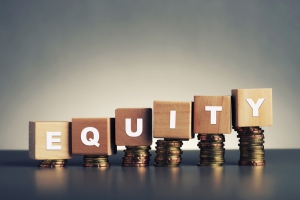
For a healthy body, your diet must contain a mix of proteins and carbohydrates. Likewise, for healthy finances, your portfolio should comprise a mix of debt and equity. Just how carbs become your source of energy to function physically, equity can become your source of wealth to function financially. Let’s understand this.
What’s with equity and wealth building?
Equity investment means investing in the stocks or shares of different companies and gaining from their growth. Although equities have high risks, they are known for generating inflation-beating returns in the long run. Thus, equities are often considered the best way to build wealth over time.
You can either trade in stocks individually or let a fund manager do it for you. The latter is possible by investing in equity mutual funds.
What are equity mutual funds?
If you look up, ‘What is equity mutual fund’, you will get a simple answer – These are mutual fund schemes that invest in the stocks of different types of companies. Such funds have at least 65% of their assets in equities. The remaining sum can be invested in debt and money market instruments as a strategy to minimise risks.
What are the types of equity mutual funds in India?
To make your life simpler, SEBI has classified equity mutual funds into 10 different types that can further be categorised on various grounds.
- According to market capitalisation
- Large Cap Fund
Large cap mutual fundsinvest in large cap companies that have a strong foothold in the market. Such funds are least risky but the returns are relatively low too.
- Mid Cap Fund
Mid cap mutual fundsinvest in mid cap companies that have high growth potential. Such funds are riskier than large cap funds but can offer better returns.
- Small Cap Fund
Small cap mutual fundsinvest in small cap companies that are not established in the market. Such funds are the riskiest out of the three but also possess the potential to deliver the highest returns.
- Multi Cap Fund
Multi cap funds invest in companies across market capitalisation. Such funds offer diversification that, in turn, helps in lowering risks.
- Large & Mid cap
As the name suggests, such funds invest in a mix of large cap and mid cap companies, thus allowing you to balance risk and returns.
- Dividend Yield Fund
Dividend yield funds invest in equity and equity-related securities of companies that declare high dividends. Such funds are considered to be less volatile since the investment is in stable companies.
- Value Fund & Contra Fund
Value funds are equity funds that invest in undervalued stocks that have the potential to grow in the long run.
Contra funds are equity funds where the fund manager bets against prevailing market trends and buys underperforming assets with a belief that they will perform in the long run.
Thus, both are high-risk funds suitable for you if you have a long-term investment perspective.
- Focused Fund
Focused funds are equity mutual funds that invest in a maximum of 30 stocks. This concentrated approach helps you gain from high conviction stocks with higher weights in the portfolio.
- Sectoral/thematic
Sectoral funds invest in a particular industry or sector such as banking, aviation, IT, etc. You stand to gain a lot if your chosen sector performs well. However, the lack of diversification makes them risky at the same time.
Thematic funds invest in multiple sectors defined by a common theme. For example, a fund with an agricultural theme will invest in sectors such as automobiles, chemicals, thermal power, etc. Such funds offer diversification, unlike sectoral funds.
- ELSS
Equity Linked Savings Scheme or ELSSis an equity-oriented mutual fund that allows you to save tax on investments up to Rs 1.5 lakh annually under Section 80C of the Income Tax Act,1961.
Now that you know the types of mutual funds that you can choose from, let’s move on to the factors that make equity mutual funds worth choosing.
Benefits of equity mutual funds
- High returns:Equity mutual fund returns are usually high but so are the risks. However, you can tackle the risks associated with equity by staying invested for a long time.
- Professional management:Unlike direct stock investing, mutual funds offer professional management. There are fund managers who invest your money in different securities with a view to maximising your returns.
- Liquidity:Except ELSS, all open-ended equity mutual funds allow you to redeem your money at any time.
- Diversification:There are several mutual fund types that you can explore and thereby have a diversified portfolio. Diversification is a great strategy for minimising investment risks.
- Small investment:You can make a lump sum investment in equity mutual funds or you can invest in parts through a Systematic Investment Plan (SIP). The good news is that you can choose the best SIP to invest in equity with an investment amount as low as Rs 500.
- Convenience:You can start investing in equity mutual funds from the comfort of your house. Investing in mutual funds online is very simple and can be done within a few clicks.
- Tax benefit:ELSS, an equity mutual fund, allows you to reduce your taxable income and save taxes. You can also save taxes by planning your investment tenure smartly.
To sum it up
Equity mutual funds are highly volatile which makes them risky. However, markets usually smoothen out over a period of time. Thus,equity mutual fundsare suitable for investors who can assume risks for building wealth in the long run.
An investor education initiative by Edelweiss Mutual Fund
All Mutual Fund Investors have to go through a onetime KYC process. Investor should deal only with Registered Mutual Fund (RMF). For more info on KYC, RMF and procedure to lodge/redress any complaints, visit -https://www.edelweissmf.com/kyc-norms
MUTUAL FUND INVESTMENTS ARE SUBJECT TO MARKET RISKS, READ ALL SCHEME RELATED DOCUMENTS CAREFULLY
Trending Articles
MUTUAL FUND INVESTMENTS ARE SUBJECT TO MARKET RISKS, READ ALL SCHEME RELATED DOCUMENTS CAREFULLY.















